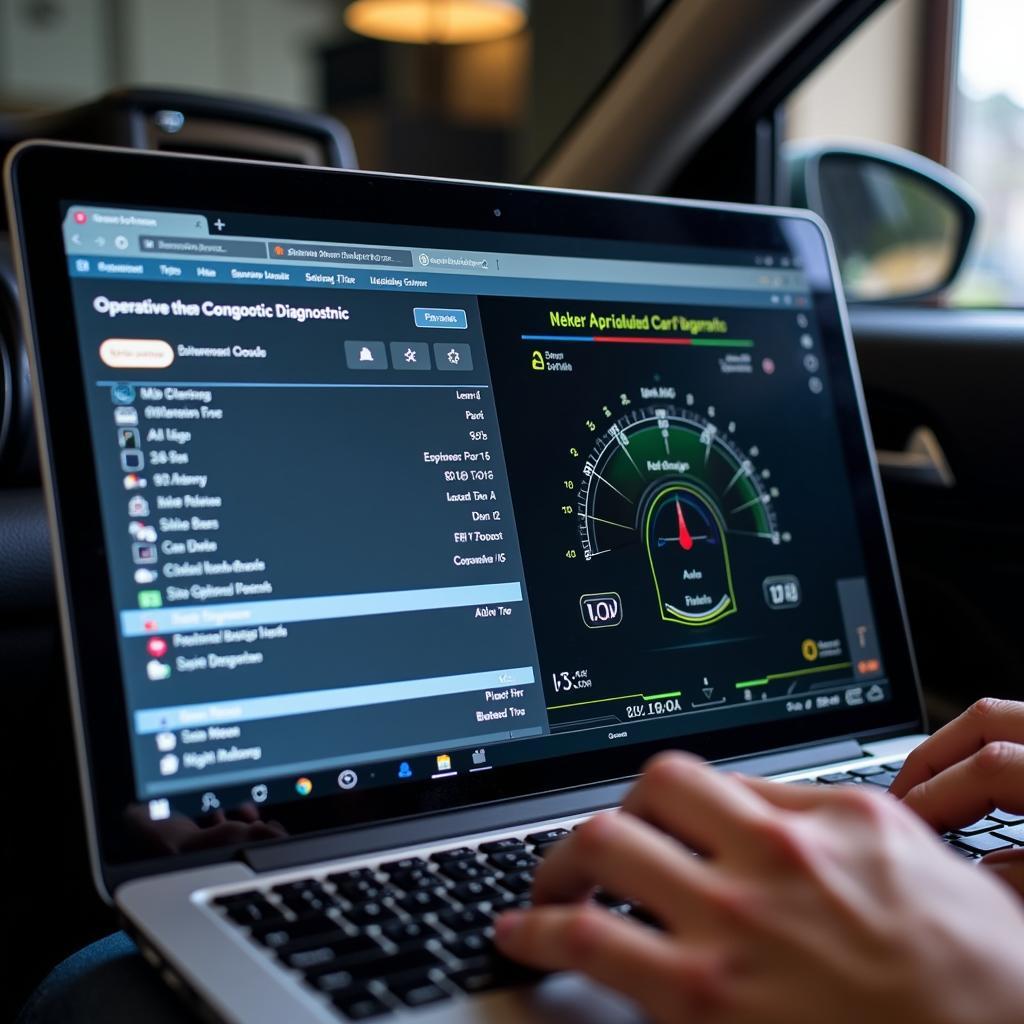Finding the Best Laptop For Car Diagnostics can feel like navigating a complex engine yourself. With so many options, specs, and features, it’s easy to get lost. Don’t worry, DiagFixPro is here to guide you. This comprehensive guide will help you choose the perfect laptop to elevate your diagnostic game, whether you’re a seasoned mechanic or a DIY enthusiast.
Why You Need a Dedicated Laptop for Car Diagnostics
Before we dive into the specifics, let’s address a common question: why not just use your everyday laptop? While your current device might suffice for basic tasks, a dedicated car diagnostic laptop offers distinct advantages:
- Optimized Software Compatibility: Diagnostic software can be resource-intensive. A dedicated laptop ensures smooth operation, preventing frustrating lags and crashes during critical diagnoses.
- Ruggedness and Durability: Garage environments can be harsh. Laptops built for car diagnostics often feature shock-resistant casings, spill-proof keyboards, and durable designs to withstand the rigors of daily use.
- Specialized Ports and Connectivity: These laptops come equipped with essential ports like USB 3.0, HDMI, and Ethernet, ensuring seamless connectivity with various diagnostic tools and accessories.
- Portability and Battery Life: On-the-go diagnostics require a laptop that’s easy to transport and boasts long battery life for uninterrupted use.
Key Features to Consider
Choosing the best laptop for car diagnostics involves evaluating key features that align with your specific needs.
1. Processor Powerhouse: Intel Core i5 vs. i7
The processor is the brain of your laptop, and for demanding diagnostic software, you need a powerful one.
- Intel Core i5: A solid choice for most users, offering a good balance between performance and affordability. It handles common diagnostic software and multitasking efficiently.
- Intel Core i7: For power users running resource-intensive applications or handling complex diagnostics on multiple vehicles, the i7 processor delivers unparalleled speed and responsiveness.
 Laptop Processor
Laptop Processor
2. RAM: The Multitasking Champion
RAM (Random Access Memory) determines how many tasks your laptop can handle simultaneously without slowing down.
- 8GB RAM: Sufficient for basic diagnostics and running one or two programs alongside.
- 16GB RAM: Ideal for multitasking, running multiple diagnostic programs, and handling large data files smoothly.
Expert Insight: “Investing in a laptop with ample RAM is crucial for mechanics dealing with multiple diagnostic tools and software simultaneously. It streamlines workflow and prevents frustrating slowdowns,” says David Miller, Senior Automotive Engineer at DiagFixPro.
3. Storage: SSD vs. HDD
Your laptop’s storage houses your operating system, diagnostic software, and data files.
- SSD (Solid State Drive): Significantly faster than HDDs, resulting in quicker boot times, faster program launches, and improved overall responsiveness.
- HDD (Hard Disk Drive): Offers larger storage capacity at a lower price point, suitable for storing extensive data logs and files.
4. Operating System: Windows Reigns Supreme
While several operating systems exist, Windows remains the dominant choice for car diagnostic software compatibility.
- Windows 10: Offers a familiar interface and robust compatibility with a vast library of diagnostic programs.
- Windows 11: The latest iteration of Windows brings a refreshed design and new features, ensuring future-proof compatibility.
 Car Diagnostic Software on Laptop
Car Diagnostic Software on Laptop
5. Display: Size and Resolution Matter
A clear and spacious display enhances visibility when analyzing diagnostic data.
- Screen Size: A minimum of 14 inches is recommended, with 15.6 inches offering a more comfortable viewing experience.
- Resolution: Opt for at least 1920×1080 (Full HD) resolution for sharp text and detailed graphs.
6. Durability: Built to Withstand the Garage
Consider a laptop with rugged features if you anticipate using it in demanding environments.
- MIL-STD-810G Certification: This military-grade standard ensures the laptop can handle drops, vibrations, extreme temperatures, and other harsh conditions.
- Spill-Resistant Keyboard: Accidents happen. A spill-resistant keyboard provides protection against liquid damage.
7. Battery Life: Power Through Long Diagnoses
Long battery life is crucial for on-the-go diagnostics or when working in areas with limited power outlets. Aim for a laptop that offers at least 6-8 hours of mixed usage.
8. Connectivity: Seamless Integration
Ensure the laptop has the necessary ports and connectivity options to interface with your diagnostic tools.
- USB 3.0 Ports: Essential for connecting to most diagnostic scanners and interfaces.
- HDMI Port: Allows you to connect to an external monitor for a larger viewing area.
- Ethernet Port: Provides a stable and reliable internet connection, crucial for software updates and online diagnostics.
- Wi-Fi 6: Ensures fast and reliable wireless connectivity for seamless data transfer and online access.
Top Laptop Recommendations
Here are some of the best laptops for car diagnostics in 2023, catering to various budgets and requirements:
- For the Budget-Conscious Professional: Lenovo ThinkPad E14
- The All-Rounder: HP ProBook 450 G8
- The Rugged Workhorse: Dell Latitude 5420 Rugged
- The Portable Powerhouse: Microsoft Surface Pro 8
Conclusion
Choosing the best laptop for car diagnostics doesn’t have to be overwhelming. By understanding your needs and considering these key features, you can find the perfect companion to enhance your diagnostic capabilities. A dedicated laptop will streamline your workflow, improve accuracy, and ultimately, make you a more efficient and effective automotive professional or DIY enthusiast.

Leave a Reply